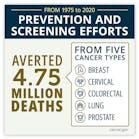In a recent study published in eClinicalMedicine, part of The Lancet Discovery Science, Moffitt Cancer Center researchers demonstrate that there is a significant unmet need for improved analyses and reporting of patient-reported outcomes in genitourinary cancer clinical trials.
The Moffitt researchers wanted to assess the quality of patient-reported outcomes data collected in clinical trials that led to the approval of genitourinary cancer therapies. Genitourinary cancers affect over 444,000 people each year in the United States. They are among the most common malignant diseases in men, including prostate, bladder and kidney cancers. Chemotherapy has traditionally been the standard treatment option for patients with genitourinary cancers; however, within the past 15 years, many new targeted treatment options have been approved based on improvements in outcomes such as overall survival and response rates. Patient-reported outcomes are often analyzed in cancer clinical trials but the quality of these analyses in genitourinary clinical trials is unknown.
The team conducted a systematic review of data that led to genitourinary cancer drug FDA approvals from February 2007 to July 2022 and identified 40 clinical trials that met inclusion criteria. They analyzed the clinical trial protocols and compared what was intended in the study to what patient-reported outcomes data was presented and published. The researchers then analyzed the quality of the patient-reported outcomes data based on a scoring scheme they developed.
The researchers found that only 67.5% of the trial publications reported patient-reported outcomes data, including 10% that reported preliminary patient-reported outcomes data in the primary clinical trial publication and 57.5% that reported patient-reported outcomes data in a secondary publication. Of the 40 clinical trials, 31 planned to collect patient-reported outcomes data, while nine did not. The median time between the primary clinical trial publication and the publication of the patient-reported outcome was 10.5 months. The researchers found that the type of patient-reported outcomes data that was collected, and the statistical analyses used to analyze the data varied greatly among the studies, and many trials still needed to perform a quality analysis. The mean quality score of the patient-reported outcomes data was 11.10 (range of 6–24) out of a possible 24 total points.
These combined data reveal that patient-reported outcomes data is often not collected in a timely manner or of the highest quality. The researchers hope their analysis will improve clinical trial design and approaches to collecting and analyzing patient-reported outcomes data to improve patient outcomes and quality of life.





